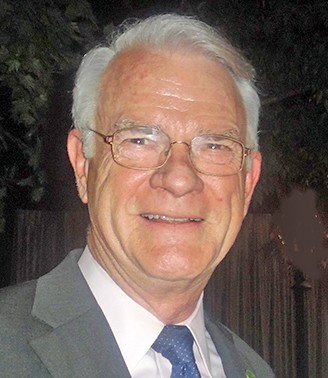Anyone who attended the regular committee meetings of the Shelby County Commission last Wednesday, May 9th, and followed that up with a visit to the full commission’s regular public meeting on Monday, May 14th, might be mildly confused about the resolution of a long-running power struggle between the commission and the county mayor’s office.
 Jackson Baker
Jackson Baker
Shelby County Mayor Mark Luttrell
At the Wednesday meeting, Mayor Mark Luttrell, term-limited and experiencing what he called his “long goodbye” to public office, heard himself applauded by commissioners in attendance and extolled by one commissioner after another for his achievements over his eight years in office, in maintaining essential county services while at the same time lowering county debt to a significant degree — by as much as a billion dollars, to a level below $900 million.
Given that May 9th was also the day on which Luttrell chose to present a $1.254 billion budget for the coming year that, if executed, would shave the county’s recalculated tax rate by a penny, to a target rate of $4.05, which is six full cents off the current rate, the hosannas might seem very much in order — especially since the proposed Luttrell budget also contains more money for schools, law enforcement, and employees at large, the latter to be provided with the $15-an-hour minimum wage which was at such extended issue during the 2016 presidential campaign.
There was none of the truculence from dissenting commissioners that had become a regular chorus during the past two years, although, as commission budget chairman Eddie Jones and others pointed out, there would be ample opportunity during the next couple of months to make such revisions as might be worth debating.
In prior weeks, and again, to some degree, on Monday, notes were sounded that were at variance with the Hakuna Matata of the May 9th meeting.
A regular feature of recent commission meetings has been a series of votes on expenditures in proposed county contracts greater than $50,000 in value. Several weeks back, the commission voted to impose the $50,000 limit as a way of limiting the mayor’s spending power and curbing his general contractual authority, in line with a charter for county government that, unlike that for the city of Memphis, restricts the chief executive to a “weak mayor” role.
That action was one outcome of the power struggle that began with disagreements during budget deliberations in 2015. In that budget year, several commissioners, dealing with what they were told would be a projected surplus, insisted on using it to fund a tax decrease. Luttrell, pleading a concern for unanticipated infrastructure needs as well as the need to reduce the county debt, resisted and ultimately prevailed. What followed was a commission resentment that would increase as members learned that the surplus was far greater than expected — a discovery that led to ever more demands for a greater share of fiscal oversight.
Other matters of contention included the commission’s desire to hire former Commissioner Julian Bolton as its own attorney. After much fuss and bother and argumentation, Bolton was allowed on as a “policy advisor,” but the official legal representative for all organs of Shelby County government would remain, under the provisions of the county charter, the mayor’s appointee as county attorney, currently, Kathryn Pascover.
At the moment, Bolton’s status is in limbo, with Luttrell poised to veto an ordinance for his reappointment — something he did once already but will have to repeat because the ordinance he received, due to a clerical error, was not the one ultimately adopted by the commission.
Starting again from scratch, the commission completed work Monday on a correct version of the reappointment ordinance that would extend Bolton’s tenure through September 30th, leaving it to a newly reelected group of commissioners to decide what to do next.
Meanwhile, the most spectacular show of commission independence was evinced just before Monday’s meeting, in a ceremony in the Shelby County Building, in which commission Chair Heidi Shafer — joined by Luttrell, Memphis Mayor Jim Strickland, and representatives of local law enforcement and medical interests — announced an ambitious $2.5 million task force plan for combating the county’s current opioid epidemic. (See Editorial, p. 8) The plan is the outgrowth of a commission initiative that Luttrell, though initially claiming authority over the matter, was induced to become a party to, via a series of court tests.